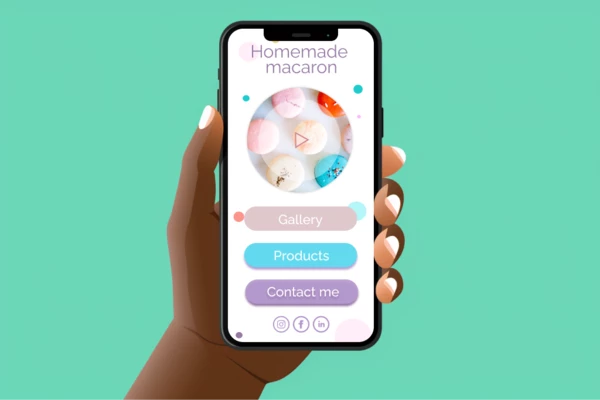What is an online portfolio?
What to choose - classic or online portfolio?
Once you know that the portfolio is essential for you, it's time to choose which form will be best for you. You can go to a classic material portfolio or select an online portfolio. So which one should you choose?
Nowadays, more and more things are done online. Job interviews themselves are increasingly taking place in the online world. Because of this, our way of presentation has also changed. Building our image on the web becomes more important. Therefore, it is worth choosing its online version when deciding to create a portfolio. In this way, you will stand out among other candidates and impress your audience. Of course, there are even more advantages to an online portfolio.
6 reasons why portfolio online is the best option for you
In an age where online presence has become crucial for everyone, having an online portfolio is practically necessary. A website portfolio is one of the best ways to make an excellent first impression on your potential audience. It will allow you to show your best and professional side.
Here are the most significant benefits of having an online portfolio:
1. Giant time savings
_webp.webp?212257.2000002861)
A portfolio website will allow you to easily, quickly, and effectively present your projects to your audience. If you want to send your offer to clients, you don't have to bother collecting materials in PDF form, printing them, or creating complex presentations. Use an online portfolio! It's a huge time saver not only for you but also for your recipients. You will present your best projects and skills to them very honestly. Thanks to it, the principals/recruiters will immediately assess your style and thus decide to establish cooperation much faster, without wasting your time!
In our Builder you can create an effective website portfolio in a few minutes. Thanks to the intuitive operation of the tool, building a portfolio is very fast! You won't be programming anything, and you don't need any graphic skills!
2. The easiest way to present the offer
A portfolio in the form of a website is the most convenient way for your clients to get to know your offer. One-click is enough for them to freely browse your designs on a laptop or mobile device at any time. It takes extra effort to open multiple attachments or unpack directories. Why should the client do this when they receives many such messages from other freelancers or companies every day? You will stand out positively if you send them something easier to use. Too complicated path to your works may lead to rejection at the very beginning! Thanks to the online portfolio, you will put everything necessary in one place, where everyone interested can reach without any trouble - going down your website!
START NOW
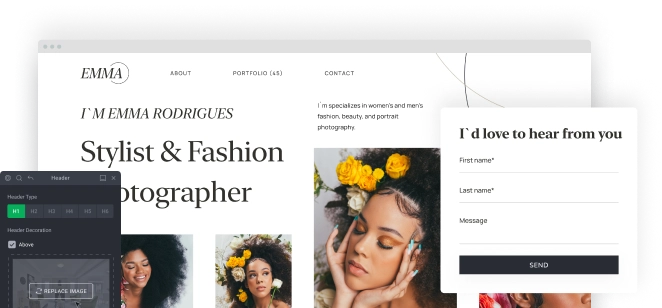
3. Reaching a much wider audience
Everyday people from all over the world surf the web searching for products, services, or new solutions. An SEO-optimized portfolio is an excellent chance for anyone to reach a wider audience. Thanks to this, potential customers will find their way to your website after entering a keyword related to your brand, industry, services, or location.
The portfolio in the form of a website gives you a chance to increase your visibility on the web. However, you must remember to implement simple SEO rules on your website! When posting content in individual sections of your portfolio, make sure that keywords are relevant to your niche, preferably those that relate to your location or service (London photographer, 360 marketing services, freelance graphic designer London).
4. Unforgettable first impression
If you think that it is enough to paste a few links on the website to present your achievements - don't do it! It doesn't look very professional, and it certainly won't make a good impression on your potential audience. Even with the best projects - presented chaotically - you will not gain the trust of your audience! Your job is to make sure you don't get rejected. A beautiful online portfolio will serve as your business card and tell others more about your skills, creativity, and experience than many long CVs.
5. Distinguishing yourself from the competition
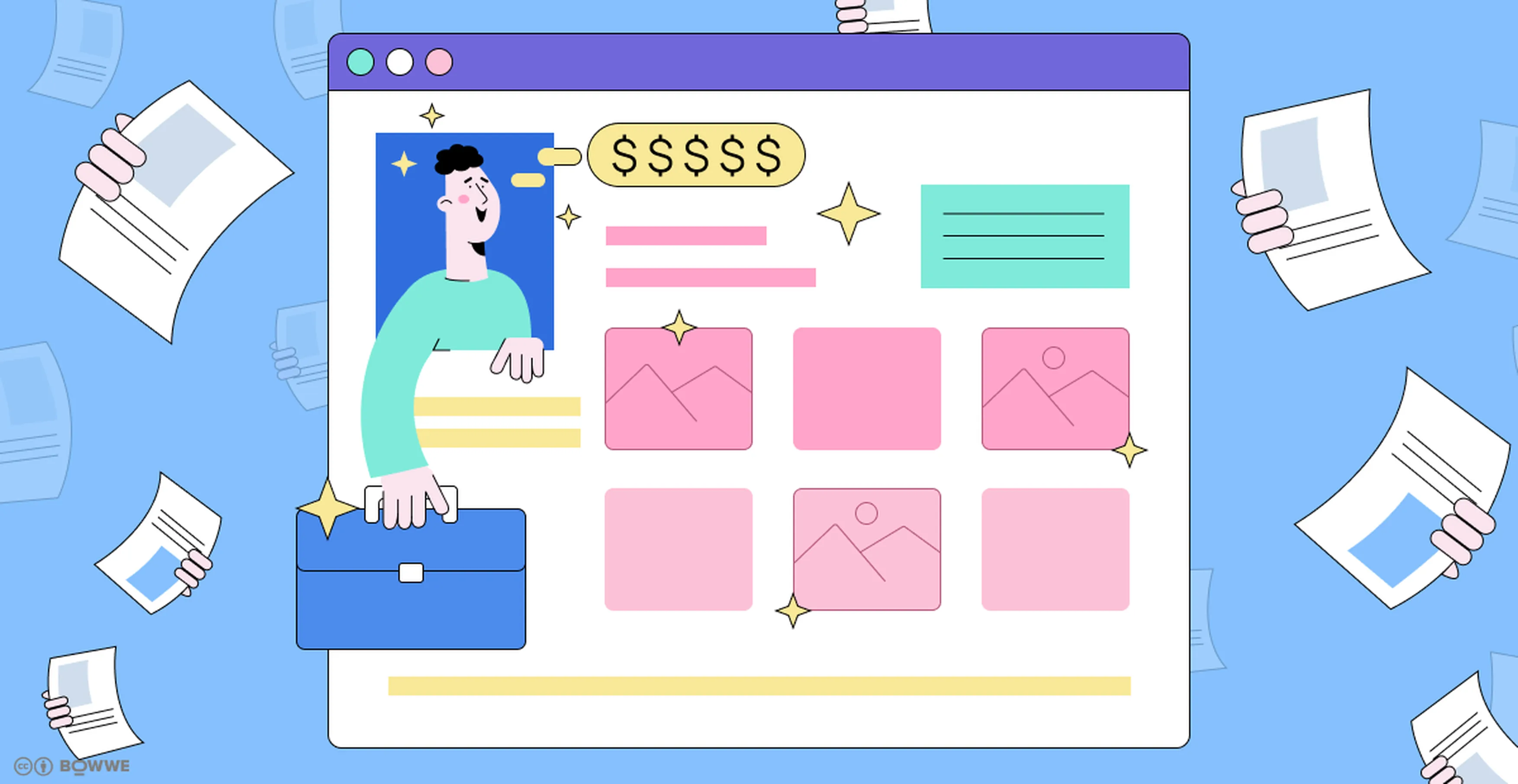
6. Trust from your audience
What should an online portfolio look like?
An online portfolio is a form of self-presentation, which plays a significant role in many industries than a CV. By creating an attractive portfolio in the form of a website, you meet the expectations of your potential recipients.
How to build a unique online portfolio that will attract recipients' attention and convince them to stay with you for long? These are essential features that any professional portfolio should have:
Creativity
To stand out from the competition, your portfolio should be original! In the portfolio, you express yourself and show your skills. It cannot be boring. The outstanding portfolio will allow you to attract the attention of the recipients. The layout of photos, colors, and graphic elements can't be accidental. The entire website should be well thought out to highlight your skills and emphasize the value of your work.
Modern and clear design
Make sure that your works are displayed nicely and aesthetically. Your portfolio must be distinguished by an eye-catching design. Consistent colors and graphic elements should work together to create the perfect background for your works and emphasize their style. It is also crucial that the portfolio's graphic design matches your niche.
Intuitive navigation
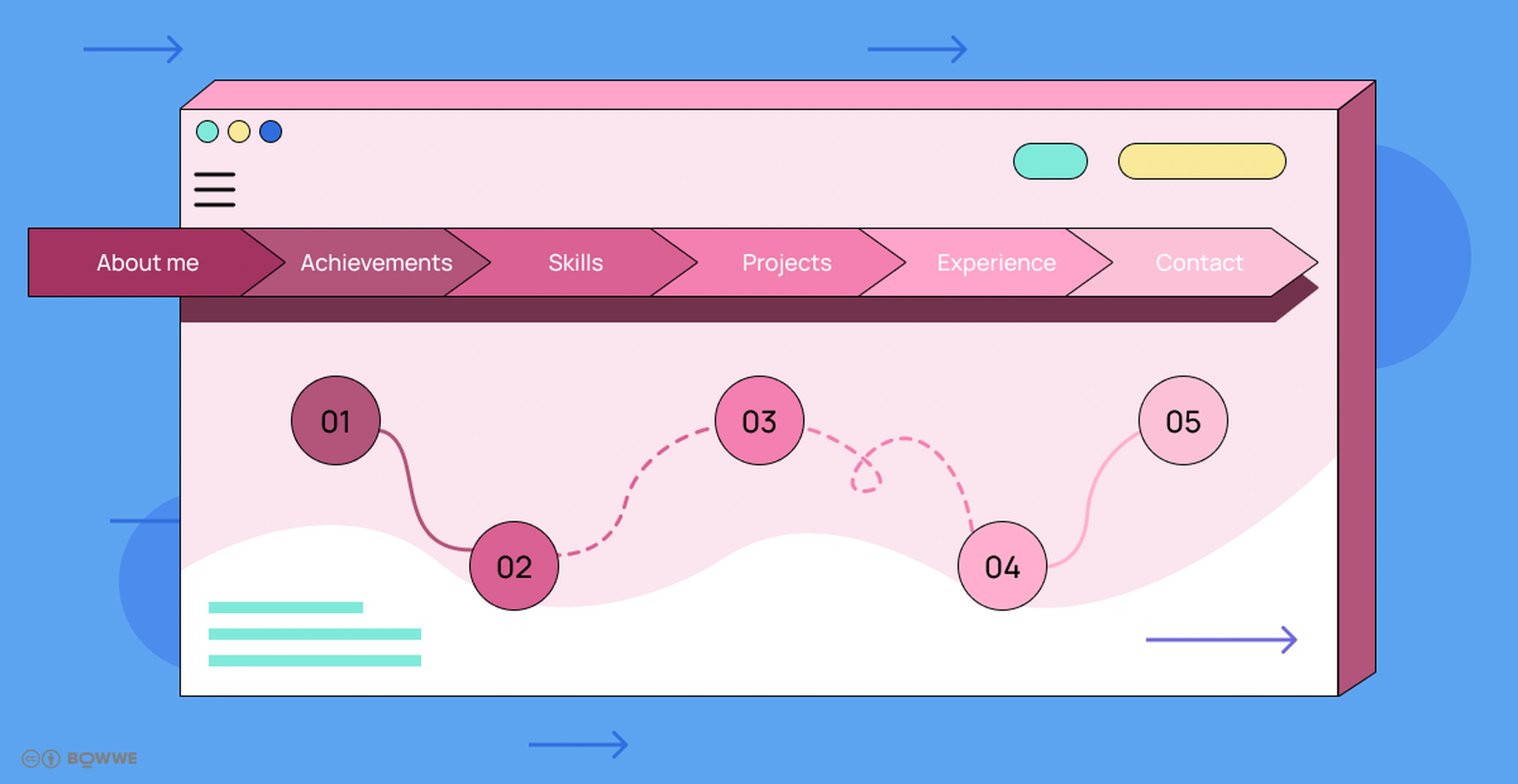
A potential customer should easily find what he is looking for in your portfolio in a few seconds. It is worth displaying only the most essential information about you and the best projects to be visible at first glance.
An excellent online portfolio should be dynamic and smooth, and flawless browsing. Users should be able to move smoothly between sections and also be able to reach your projects quickly. The gallery with projects is the most crucial part, which is the axis of each portfolio - therefore, access to it should be accessible and visible. Overly long descriptions or unnecessary sections shouldn't dominate the portfolio page - this can effectively discourage visitors from staying on the site.
Topicality
Your online portfolio must always be up-to-date and only contain the latest information and the latest projects! By posting your projects from years ago, you are giving potential recipients a signal that nothing interesting has recently happened in your career. Surely your audience will take this as a minus.
Online visibility
Having an online portfolio is the best way to attract new customers. Even the most beautiful portfolio site will not fulfill its function if no one knows about its existence. Therefore, it is worth taking care of online visibility and reaching the largest possible audience.
By creating a portfolio in BOWWE, you gain access to functions related to positioning that will increase the visibility of your pages in search engines. Thanks to this, potential customers will quickly find out about your existence - all they need to do is enter the password related to your services in the search engine.
Responsiveness
_webp.webp?590583.1000003815)
Most of your audience will be browsing your portfolio on smartphones. Therefore, the portfolio website must be adapted to mobile devices. A responsive portfolio will ensure that the graphics or photos will not lose their quality regardless of the type of device on which they are displayed.
By creating a portfolio in BOWWE you don’t have to worry about this issue - your pages automatically adapt to different screens.
What tools to choose to create an online portfolio?
A professional portfolio in the form of a website will allow you to present your projects exactly as you want. Unfortunately, many CMS tools have limitations, making it challenging to create an original portfolio in line with your vision. However, there are ways to create a beautiful portfolio easily and fast without wasting time and money! Using our tool, you don't need to spend hours building a portfolio from scratch. You will also not require any particular website design course. Thanks to the intuitive drag and drop technique, in BOWWE, you will build a portfolio without problems. Before creating your portfolio, check out the best way to do it below!
START NOW

How to create a professional portfolio step by step?
_webp.webp?646835.1000003815)
1. Set a goal you want to achieve with a portfolio
Without knowing what you want to achieve with a portfolio, you will never achieve it!
The first and most crucial step to start creating any portfolio is to set a goal. Before choosing a portfolio style or template, ask yourself a few key questions:
→ What is your experience - do you have commercial projects to show off, or are you just beginning your career?
→ Do you specialize in one industry, or are you versatile and take on various challenges? The way you want to develop your business will depend on how your achievements are presented in your portfolio.
→ What do you ultimately want to achieve? Get the first customer or increase the number of monthly orders? Provide specific numbers and the time you want to accomplish it.
Are you just starting your business, and you don't have any commercial projects to show off yet? The best solution will be to create example works that will serve as a sample of your capabilities!
If you already have a lot of experience, a challenge awaits you - choosing the best projects. If you focus on one subject, e.g., a photographer specializing in wedding photography, it is worth adding variety to your photo gallery. So choose diverse photos. Thanks to this, you will create a visually engaging story that will interest the potential recipient and encourage them to discover more of your works.
2. Choose your best projects
When creating an online portfolio, focus on quality, not quantity. You don't have to post all your projects - social media will be better for that. In a professional portfolio, only the most representative projects relevant to your potential audience should be included.
How do you choose the best works (especially if you have a lot of experience)? Do it by elimination. First, decide on a category. Following the example of a photographer, the category may be wedding photos. Now select photos from only a few of the most interesting photo sessions. Then choose dynamic and varied shots to avoid monotony. They will be the central part of your portfolio. If you're photographing other things, add a few other high-quality photos outside of the category for variety.
Don’t include more than 20 photos in your portfolio. The potential client will not have the time (possibly also patience) to browse through too many works. So it's better not to share everything at once but only to arouse interest. Thanks to this, you will encourage customers to contact you, and then it will be much easier to convince them of yourself!
Where to look for portfolio materials?
Sometimes you will need additional materials to add variety to your portfolio. Maybe they will be title photos for texts, graphics to illustrate a topic or background for specific sections. Where to look for such materials?
There are many places on the Internet where you can find free multimedia materials that you can safely use in your portfolio:
→ portfolio images and videos can be found on Pexels, Unsplash, Shutterstock etc.
→ portfolio music can be found on filmmusic, bensound etc.
Remember, when using materials that aren't yours, always check on what terms you can use them and most importantly - don't attribute their authorship to yourself.
3. Plan your structure
It is essential to plan your entire portfolio structure well. It is extremely important in terms of UX (User Experience). Thanks to proper navigation, users will guide through the website smoothly. Create a detailed plan for each section and subpage to direct your users through all the essential elements properly. Guide visitors to build their trust and encourage them to take a specific action (e.g. fill out a contact form). So make sure your call-to-action (CTA) buttons are prominently displayed.
Here are some things to include in your portfolio:
About me
In this section, visitors have the chance to get to know you a little closer and learn more about your work, goals, values , or interests. This is the most personal part where you can introduce yourself. You can add your photo here, showing that your passion is what you are doing. Then create a description that will interest your audience and be easy to remember. Think about how you want to be seen by your audience and customers. Make your description sound like that! You can share the story of how your business started or your inspiration. Remember, a sentence or two about who you are and what you do is all it takes.
Gallery (presentation of works)
_(2)_webp.webp?1858463.6000003815)
The most important element in each portfolio. After a short introductory part, visitors should visit the gallery with your works. They shouldn't waste time wading through other sections or descriptions that are too long. Remember about a clear layout and presentation of photos, videos, etc. All materials should harmonize and present high quality.
Work results
Don't just show viewers the result - show them what you've achieved as well. Present your projects in the form of success stories or case studies. Tell the story behind the project. What has the client gained thanks to your work? Maybe, for example, it contributed to the increase in sales of a given company? After all, one customer's success achieved thanks to you may persuade others - who are in a similar situation - to use your services! Nothing will convince a client to cooperate with you more than concrete results. By posting the results in the form of statistics, graphs, or a simple description of the results, you will quickly increase your credibility and gain the trust of potential clients!
Contact
An online portfolio should enable customers to contact you quickly. So don't forget to put your phone number or e-mail address in a prominent place. And if you visit social media frequently, link to the channels where you can be contacted the fastest.
You can also place a contact form on the portfolio page, which will allow all people interested in cooperation to contact you directly. When creating a portfolio in our tool you can easily add a contact form without installing special plugins - use a ready-made template or add a form using the tool!
Reviews
Ask your customers for feedback and include it in your portfolio. There is no better way to confirm your skills than by posting a section with Testimonials (recommendations from satisfied customers). The fact that others are willing to recommend you will surely inspire the trust of your audience. Make sure your opinions are authentic and add photos or names of customers (of course, after obtaining their consent). Remember, however, that all opinions have to be true! Customers will quickly sense a falsehood, and then they will certainly not cooperate with you!
Infographics
Using infographics on your portfolio page will help your customers capture and remember the most important information. With the help of timeline infographics, you will dynamically present your CV or the process of how you work. The charts will serve you as a visualization of your results. It is an accessible way to present numerical data in case studies that you can include in your portfolio. Attractive icons will catch the eye and interest your audience - so use them to highlight your strengths or show off your knowledge of languages or programs.
Social media
Integrating the website with social media has a massive impact on positioning. It is also an effective way to reach new customers and establish direct contact with them. So you need to ensure that your portfolio website is integrated with the social channels that are crucial to you. Icons referring to social media channels should be nicely designed and visible on the homepage of your portfolio.
4. Choose how to create a portfolio
You can do a portfolio in two ways: starting from scratch or using a template.
The first solution does not necessarily mean you have a long way to the goal. At BOWWE, even people without IT knowledge can easily and quickly build their portfolio from start to end. Thanks to the drag-and-drop method and ready-made widgets, you will quickly create a professional portfolio with excellent SEO.
In turn, using a template is ideal for those who want to have a high-quality portfolio without spending a lot of time. BOWWE templates are designed with the needs of people from many industries in mind. Are you afraid that the ready-made templates will prevent your portfolio from distinguishing from the others? Nothing could be more wrong! In BOWWE, you can always easily modify the portfolio structure and decide on the layout or the number of photos, which guarantees you a unique style. By using ready-made templates adapted to various industries, you can create an impressive online portfolio in no time!
Here are some portfolio examples:
Template #1: A portfolio in which you will present your skills...
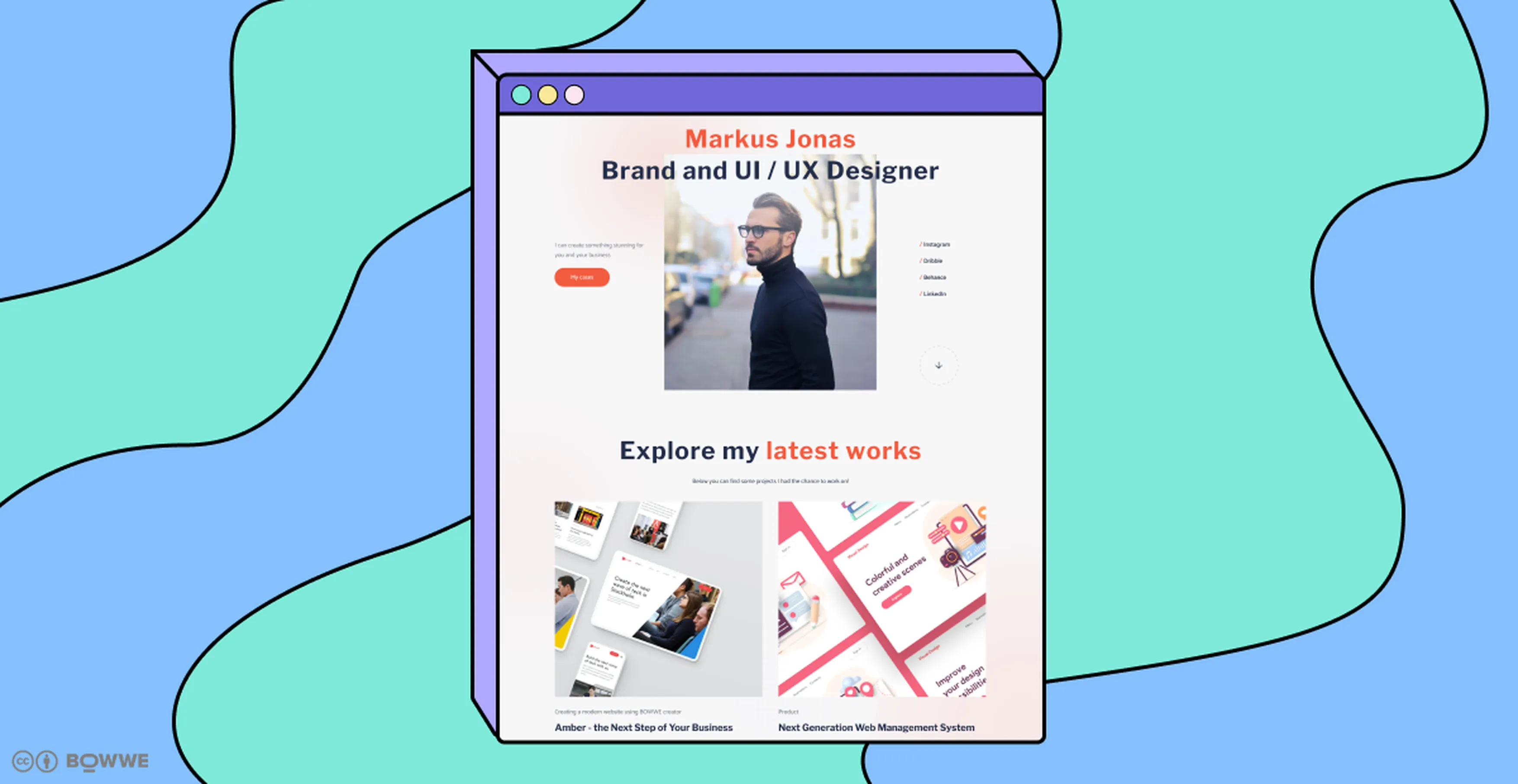
See full template!
A subdued portfolio in which you will present your skills and projects in an accessible way. The percentage chart will clearly show to what extent you are using certain skills and how much you have left to master them completely. Also, thanks to a neat gallery with your projects, you will save your recipients from looking for the effects of your work in the depths of the Internet. In this portfolio, you will find everything you need to effectively convince the recipient that you are a master in your profession.
Template #2: A visual portfolio that speaks with an image...
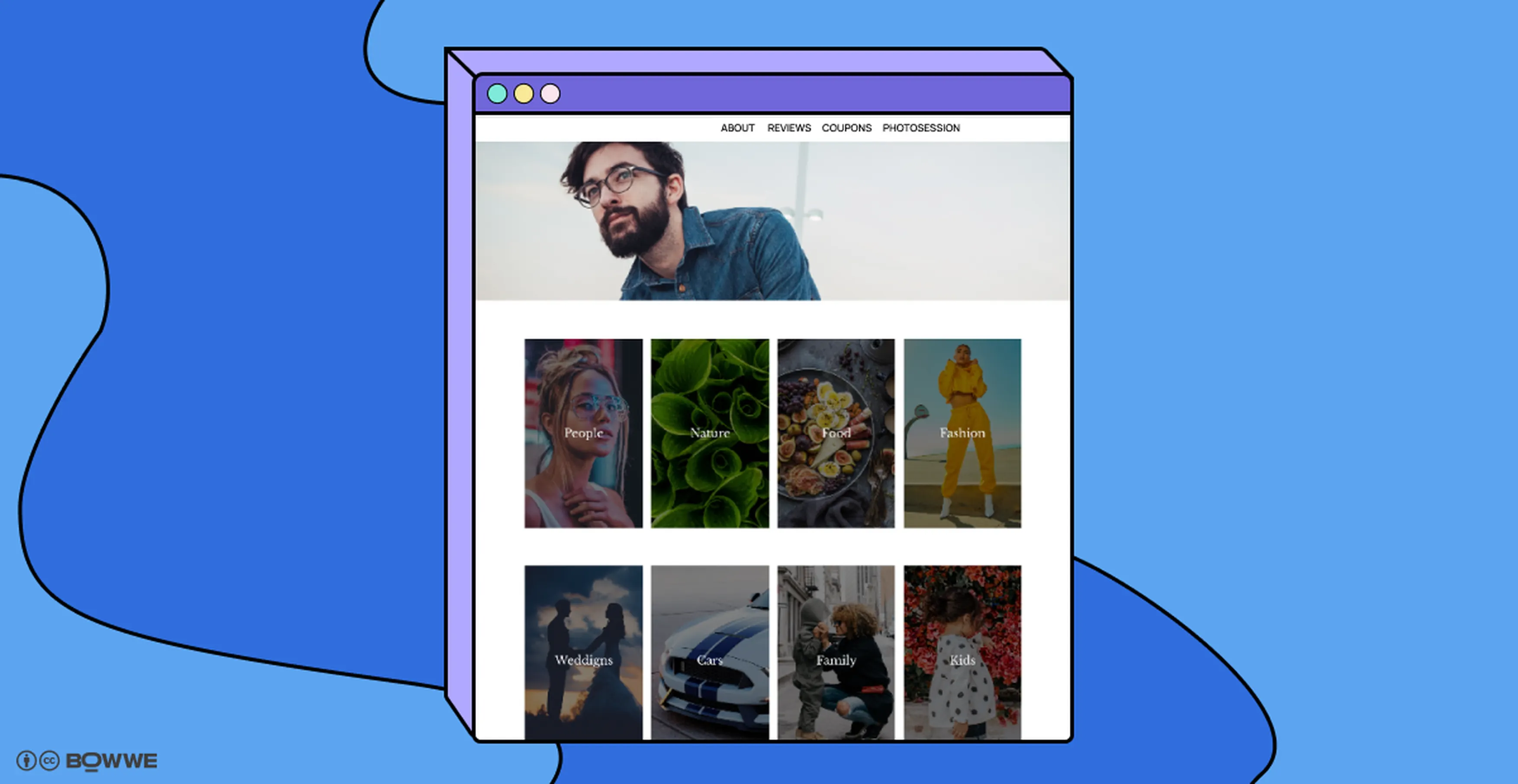
See full template!
Template #3: A creative portfolio that catches attention...
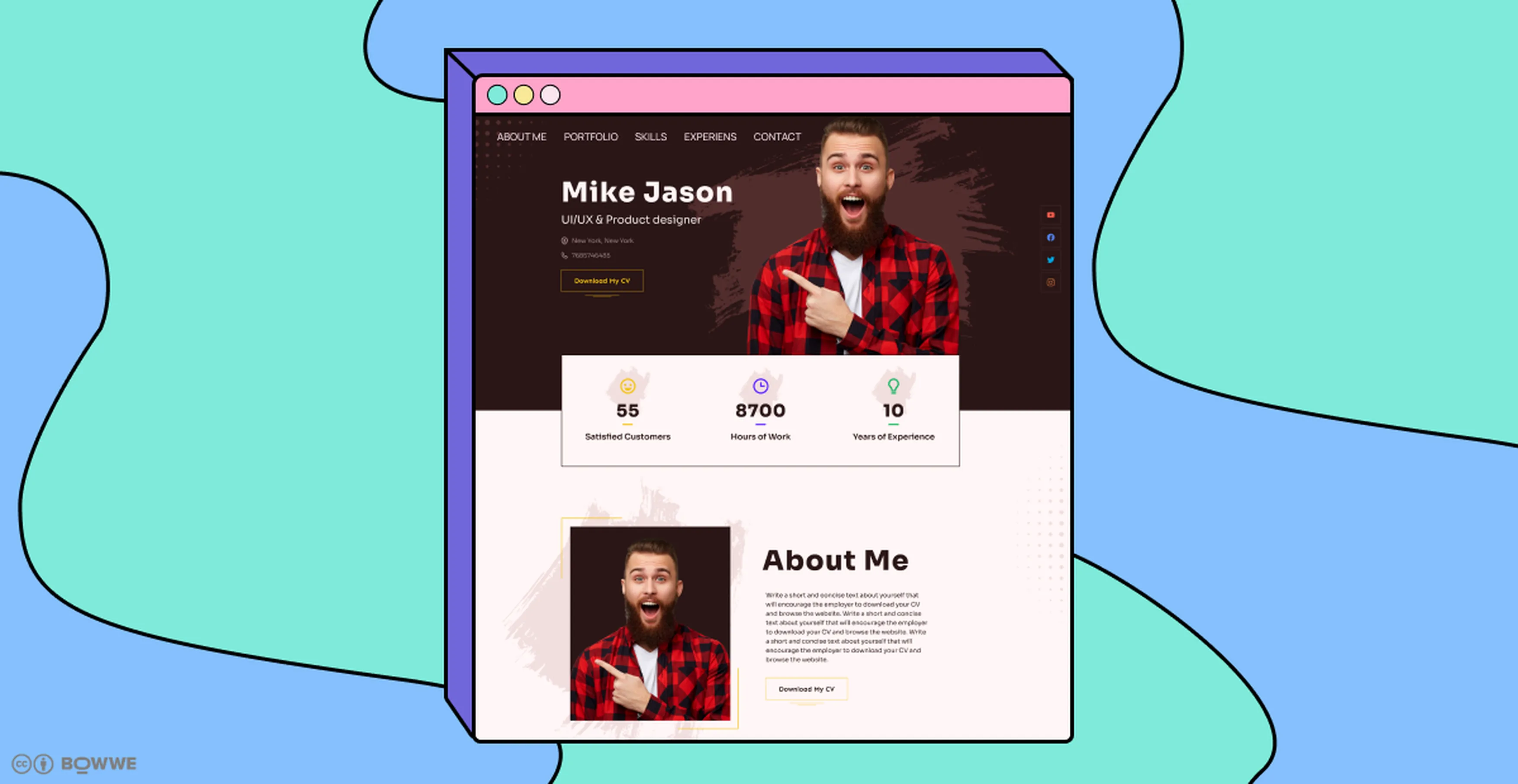
See full template!
An example of an expressive portfolio that will allow you to present the most important information to the recipient step by step. From a numerical representation of the results of your work to the individual stages of your educational and professional path. Easily connect with any audience with conspicuous call-to-action buttons and accessible contact information. Show off your best side with this portfolio template!
How to promote your online portfolio?
Your portfolio can remain invisible to potential employers and clients without proper promotion. Fortunately, there are several simple strategies that you can use to help promote your online portfolio and get the attention it deserves.
1) Make sure your portfolio is up-to-date and reflects your best work
You should also include a link to your portfolio in your email signature and in any professional profiles that you may have. This will ensure that potential employers and clients can easily access your portfolio.
2) Start leveraging social media to promote your portfolio
Share your portfolio on your personal accounts and industry-related groups. You can also create dedicated social accounts to share your portfolio and interact with potential employers and clients.
3) Take advantage of guest posting
Find industry-related blogs and websites and offer to write content for them. Make sure to include a link back to your portfolio in your bio. This will help to drive traffic to your portfolio and get you noticed.
4) Promote on job search portals
You can link to your portfolio page on platforms like useme, upwork, freelancer etc. Thanks to this, your portfolio will go directly to the principals present on the websites.
Create your online portfolio today!
Creating an online portfolio is a great way to showcase your work and talents to the world. With a few simple steps, you can create an impressive portfolio for free and start using it to network, make contacts and land the job of your dreams. So, what are you waiting for? Get started today and create a portfolio that will help you stand out from the crowd!


Karol is a serial entrepreneur, e-commerce speaker m.in for the World Bank, and founder of 3 startups, as part of which he has advised several hundred companies. He was also responsible for projects of the largest financial institutions in Europe, with the smallest project being worth over €50 million.
He has two master's degrees, one in Computer Science and the other in Marketing Management, obtained during his studies in Poland and Portugal. He gained experience in Silicon Valley and while running companies in many countries, including Poland, Portugal, the United States, and Great Britain. For over ten years, he has been helping startups, financial institutions, small and medium-sized enterprises to improve their functioning through digitization.




